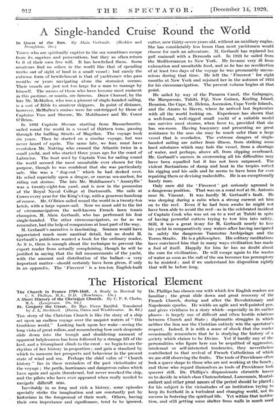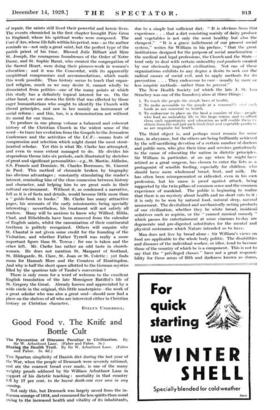The Historical Element
A Short History of the Christer Church. By C. P. S. Clarke, M.A. (Longrnarts. 10s. 6d.) St. Gregory the Great. By Mgr. Pierre Batiffol. Translated by J. L. Stoddard. (Burns, Oates and Washbourne. 3s. 6d.) TEEE story of the Christian Church is like the story of a ship set upon an endless voyage over the unquiet waters, of " this troublous world." Looking back upon her wake—seeing the long vista of great rollers, and remembering how each desperate slide down into the trough and shuddering moment of apparent helplessness has been followed by a strange lift of the
keel, and a triumphant climb to the crest—we begin to see the rhythm of her history in proportion ; and gain a standard by
which to measure her prospects and behaviour in the present state of wind and sea. Perhaps the chief valire of " Church history " lies in these reminders of the past vicissitudes of the voyage ; the.periLs, hurricanes and dangerous calms which have again and again threatened, but never wrecked the ship, and the.pilots who have ever appeared when really needed to navigate difficult seas.
Inevitably in so long and rich a history, some episodes specially strike the imagination and are constantly put by histOrians in the foreground of their work. Others, having their own importance and significance, tend to be ignored.
Dr. Phillips has chosen one with which few English readers are familiar ; the great slide down and great recovery of the French Church, during and after the Revolutionary and Napoleonic epochs. He wields an agile and well-pointed pen, and gives vividness to a story which—especially in its earlier phases—is largely one of difficult and often hostile relations between Church and State ; diplomatic struggles in which neither the lion nor the Christian entirely win the spectator's respect. Indeed, it is with a sense of shock that the reader occasionally remembers that he is studying the history of a society which claims to be Divine. Yet if hardly any of the personalities who figure here can be acquitted of aggressive, intolerant or self-interested tendencies, they nevertheless contributed to that revival of French Catholicism of which we are still observing the fruits. The tools of Providence often look a queer shape to those who are not working at the bench and those who regard themselves as tools of Providence look queerer still. Dr. Phillips's dispassionate chronicle leaves us to decide in which class Chateaubriand, Lamennais, Montal- embert and other great names of the period should be placed ; for his subject is the vicissitudes of an institution trying to keep its foothold in a turbulent and changing world, not its success in fostering the spiritual life. Yet within that institu- tion, and still getting some shelter from walls in much need
of repair, the saints still lived their powerful and heroic lives. The events chronicled in the first chapter brought Pere Grou to England, where his spiritual works were composed. The Cure d'Ars, whose life falls within his period, was--as the author reminds us—not only a great saint, but the perfect type of the parish priest of his time. Blessed Julie Billiart and Mere St. Joseph, the courageous foundresses of the Order of Notre Dame, and St. Sophie Barat, who created the congregation of the Sacred Heart, were doing their pioneer-work in women's education ; and it was the Concordat, with its apparently unspiritual compromises and accommodations, which made this work possible. Thus history seems to teach that organ- ized religion, much as we may desire it, cannot wholly be dissociated from politics—one of the many points at which this study has a definitely topical interest for us. On the other hand, we are shown the little that was effected by those eager humanitarians who sought to identify the Church with liberal principles, and saw in her mainly an instrument of social reform : and this, too, is a demonstration not without its moral for our times.
To produce in one plump volume a balanced and coherent history of the Christian Church in the widest sense of the word—to trace her evolution from the Gospels to the Jerusalem Conference and the activities of the I.C.F.—means feats of compression and selection which might daunt the most stout- hearted scholar. Yet this is what Mr. Clarke has attempted, and even to some extent managed to do. He divides his stupendous theme into six periods, each illustrated by sketches of great and significant personalities—e.g., St. Martin, Aldhelm, SS. Francis and Dominic, St. Charles Borromeo, St. Vincent de Paul. This method of chronicle broken by biography has obvious advantages ; constantly stimulating the reader's interest, reminding him of the close connexion between history and character, and helping him to see great souls in their cultural environment. Without it, so condensed a narrative, full as it is of facts and details, would become little more than a " guide-book to books." Mr. Clarke has many attractive pages, his accounts of the early missionaries being specially interesting ; nevertheless, his treatment will not satisfy all readers. Many will be anxious to know why Wilfred, Hilda, Chad, and Etheldreda have been removed from the calendar of English saints, whilst the canonization of their continental brethren is politely recognized. Others will enquire why St. Chantal is not given some credit for the founding of the Visitation, and whether Father Tyrrell was really a more important figure than St. Teresa : for one is taken and the other left. Mr. Clarke has rather an odd taste in church- women. He does not mention St. Margaret of Scotland, St. Hildegarde, St. Clare, St. Joan or St. Colette : yet finds room for Hannah More and the Countess of Huntingdon. And why is half the short space allotted to the German mystics filled by the spurious tale of Tauler's conversion ?
There is only room for a word of welcome to the excellent English translation of the late Monsignor Batiffol's life of St. Gregory the Great. Already known and appreciated by a wide circle in the original, this little masterpiece—the work of a great scholar who was also a great soul—should now find a place on the shelves of all who are interested either in Christian history or Christian character.
EVELYN UNDERHILL.













































 Previous page
Previous page